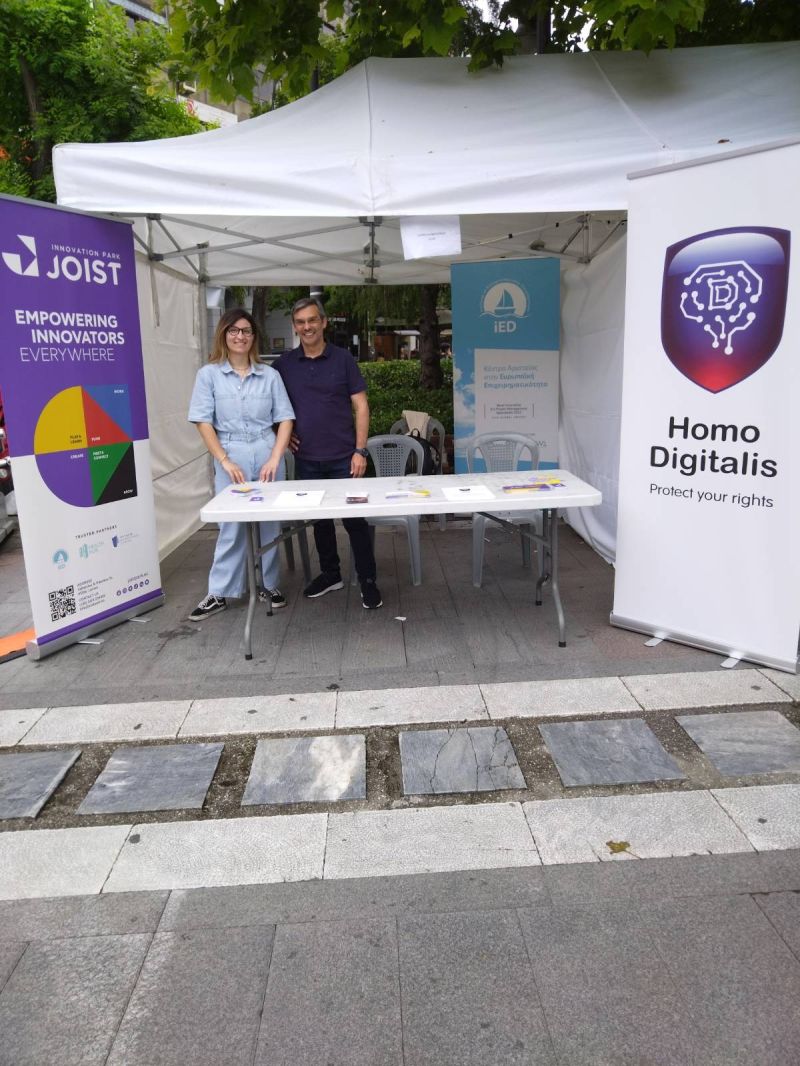We call on the European Parliament, the European Commission and the Council of the EU to prioritise fundamental rights over profits
As the EU institutions move forward in “trilogue” negotiations, the last stage for the adoption of the proposed EU legislation on AI #AIAct, we are taking a stand again!
150 civil society organisations, including Homo Digitalis, are calling on the European Parliament, the European Commission and the EU Council to put people and their fundamental rights ahead of profits!
In the coming period we intend to take initiatives in this regard at national level as well! You can read our letter here.
Homo Digitalis participates again in an event of the Greek KnowledgeNet Chapter of IAPP
Next Thursday, 13/7, at 19:00, Homo Digitalis will have the great pleasure and honor to be present at the event of the Greek KnowledgeNet Chapter of the IAPP – International Association of Privacy Professionals on “Managing the rights of data subjects”.
There we will be represented by our new Director in Artificial Intelligence & Human Rights issues, Lambrini Gyftokosta, in a panel in which Ms. Kalli Karveli, Legal Auditor, at the Data Protection Authority and Mr. Evangelos Katsaras Senior Associate, ALG MANOUSAKIS LAW FIRM will participate.
We would like to thank the organizers for the invitation and the interest in our actions! You can find out more about the venue of the event on its official page here.
Now you can watch our talk at CPDP2023
Would you like to watch what Homo Digitalis said at the CPDP Conferences 2023, but you were not there??
No problem! The presentation of Stergios Konstantinou, who represented us, is freely available!
You can watch it here.
The EU's Fundamental Rights Agency once again makes explicit reference to our important work
For yet another year, the European Union Agency for Fundamental Rights honours Homo Digitalis with an explicit reference to our actions in its annual study!!
It is a great success for the official EU agency and the only independent reference centre for the promotion and protection of human rights in the EU to make reference to our important interventions at national level.
We take strength to continue with more actions in the new season!
You can read the FRA’s annual study for free, here.
Homo Digitalis submitted a request for access to documents before FRONTEX on the deadly shipwreck off Pylos
In the early hours of June 14, an old steel fishing trawler, reportedly carrying up to 750 people, capsized southwest of Pylos, Greece. More than 80 people have been confirmed dead, more than 100 people have been rescued and hundreds of people are still missing.
According to reports, the boat started its journey from Libya on Friday 9/6, and had already been travelling for more than 4 full days in the Mediterranean, when on Tuesday 13/6 morning, the Italian authorities were informed of its existence by an activist. They then contacted the Greek authorities.
The EU has put in place an expensive surveillance system, called EUROSUR, which consists of satellites and drones. The aim of this system is to allow FRONTEX to monitor the EU’s external borders in order to help protect people’s lives, particularly in the Mediterranean Sea. FRONTEX has the obligation to share the information collected by satellites and drones with Member States in order to enable timely rescue operations.
Yesterday, Homo Digitalis submitted a request for access to the documents before FRONTEX, in which we ask this EU agency for answers to the following questions:
1) Were there any EUROSUR drones and/or satellites operating in the area where the vessel in question was travelling from 9/6 to 13/6?
2) Was Frontex aware of the existence of the vessel in question before Tuesday 13/6, from EUROSUR technologies?
2a)If Frontex was aware, when did it inform the Greek and Italian coastguard of the situation, as required by the EUROSUR Regulation, so that further monitoring of the vessel could be carried out and rescue operations organised?
2b) If Frontex was not aware, what are the reasons for the failure of the EUROSUR system, which is presented as a solid solution for monitoring the EU’s external borders in the Mediterranean region and protecting human lives?
You can read our request in detail here:
The European Parliament plenary voted to ban mass biometric surveillance in public places
The European Parliament plenary voted today on its text on the proposed legislation on Artificial Intelligence (AI Act).
The ban on mass biometric surveillance in public places in real time was adopted by the plenary with 335 votes in favour to 235 votes against. We are very proud of the outcome of this vote, despite the fact that there remain provisions in the proposed legislation that pose significant challenges to Human Rights!
But how did our representatives vote? On 25/5, Homo Digitalis had sent open letters to all Greek MEPs, so that no one can claim not to know what is at stake in today’s vote.
We are glad that MEPs Arvanitis, Kokkalis, Kouloglou, Kountoura, Kirtos, Papadimoulis, and Papandreou voted in favour of maintaining the position of the IMCO and LIBE Committees of the European Parliament on the ban. We are concerned that MEPs Vozemberg-Vryonidis, Zagorakis, Kefalogiannis, Meimarakis and Spyraki voted against maintaining this position, and we remain at their disposal to highlight with our positions and arguments the need for a ban on mass biometric surveillance in public places in real time without exceptions.
Nothing has been decided yet, however, as the trilateral negotiations are now beginning!
Homo Digitalis at the 3rd Youth & Lifelong Learning Festival in Larissa!!
From today until Thursday 15/6, Homo Digitalis is together with JOIST and iED – Institute of Entrepreneurship Development at the 3rd Youth & Lifelong Learning Festival in beautiful Larissa!!
Come to the central square (Sapka Square) to enjoy a unique program full of music, film screenings, workshops, interesting talks and many, many surprises!
Many thanks to our member Anastasios Arampatzis who represents Homo Digitalis in the festival and the organizations JOIST & iED – Institute of Entrepreneurship Development for the kind invitation and the excellent cooperation!!!!
We will be waiting for you at the booth to discuss new technologies and Human Rights in the modern digital age!
The detailed programme of the 3rd Youth & Lifelong Learning Festival can be found here.
Our third speech at the CPDP was a success
Last Friday we spoke at the workshop “The Right of Access to Police Databases” organized by Vrije Universiteit Brussel in the framework of CPDP Conferences 2023, next to representatives of EDPS – European Data Protection Supervisor , Europol and Université Saint-Louis – Bruxelles!!
Homo Digitalis was represented by Stergios Konstantinou, talking about our relevant actions / cases and the legal framework in Greece and Cyprus!
We would like to thank the organizers for the kind and honorable invitation and their interest in our actions!
Our participation in the 8th Data Privacy & Protection Conference 2023
Homo Digitalis has the great pleasure and honor to participate in the 8th Data Privacy & Protection Conference 2023, on 31/05, at OTE Academy Amphitheatre!
There we will talk about Homo Digitalis’ actions before the DPA, giving a brief overview of our cases on Electronic Communications Metadata Preservation, Biometric Data Bases, Artificial Intelligence Systems, and much more!
We would like to thank the organizers BOUSSIAS, LAWYER | The Business Magazine for their honorary invitation and interest in our activities, as well as for providing a number of free invitations for our members!
Homo Digitalis will be represented in our presentation by our Board Secretary Eleftherios Chelioudakis
You can register and see the detailed agenda of the conference here.








